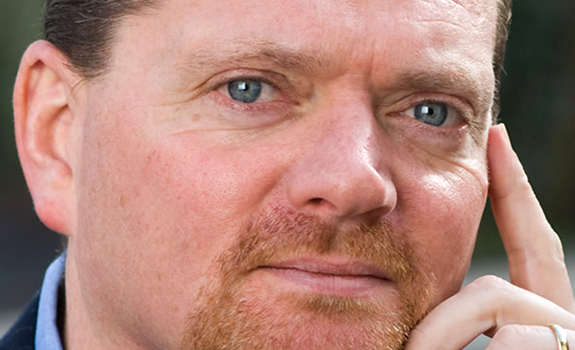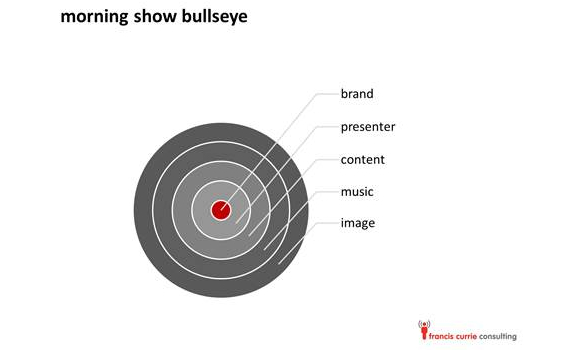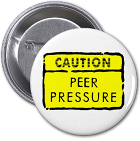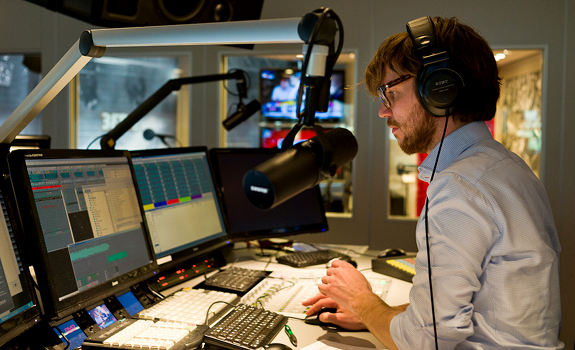Successful morning show positioning is about being different enough, international radio consultant Francis Currie says in an interview with Radio))) ILOVEIT.
Listeners choose a radio station for the same reason they choose a product – because of how it’s different, not because of how it’s the same. In this first part, we’ll talk about how to position your morning show (and how to re-position your competition), 5 essential ingredients of every breakfast show and several best practices of radio team building.
“Radio’s ubiquity is challenged”
Radio still reaches many
Francis Currie worked as a radio presenter, music director and program director at UK radio stations. He successfully programmed Magic and Heart, before starting radio consultancy work in 2007. “From listening to pop radio on AM before commercial radio launched in the UK, to spending pretty much my whole career working in the medium, I love radio and I am extremely excited and positive about the future”, Currie says. In many countries, radio still has a weekly reach of 90%. In the UK, people listen for an average of 22 hours a week. “When you consider the pressured lives people lead, that is a fantastically high number. It is mirrored in many markets around the world.”
 People are always on(line)
People are always on(line)
“Having said that, many people in radio are struggling to get to grips with the new reality of today’s ‘always on’ society where listeners have an enormous choice about how they spend their time. In this new world, radio has no right to be in the pocket, car or kitchen and competes with an unlimited selection of alternatives for every minute of the listener’s time.” [In addition, young people are spending less time on radio, partly due to social media.]
Broadcasting’s competition is increasing
Morning shows are still one of the pillars of radio programming. Based on your experience with around 50 stations, from Europe to the Middle East, what are universal trends for morning radio?
“There are several developments that morning shows are dealing with right now. First of all, competition for people’s time and attention is increasing exponentially”, Francis Currie explains, mentioning the whole range from TV and games to streaming services and social media. “The explosion of smart phones, tablets and mobile phones means that radio’s ubiquity is challenged. Its dominance – even in the car and on the move – is under attack.”
“The magnetic properties that drive any morning show
nearly always come from the personalities”

Radio consultant Francis Currie knows that personalities make a morning show (photo: Francis Currie Consulting)
Radio’s resources are limited
Currie sees that morning show production teams are getting smaller. “There was a time when big shows in major markets had an executive producer, studio producer, sound producer, technical producer, overnight producer, daytime producer, comedy writer, dedicated news anchor, dedicated travel reporter in a plane or helicopter, and a retained group of contributors and performers. That resourcing is now the preserve of a few, highly successful stations. I’d say the majority has no production support at all.” He adds that even program directors are becoming content directors who often look after several brands – including web streams, web sites, social media, street teams, marketing activities and public relations.
 Personality radio has priority
Personality radio has priority
Another development is that radio stations are leaning more and more on engaging personalities (such as Elvis Duran). “People who are consistently interesting, entertaining, likeable and charismatic are few and far between. A personality is the glue that holds a show together. The magnetic properties that drive the cume, share and fame of any morning show nearly always come from the personalities on the show.”
Give people instant entertainment
As listener attention spans are getting shorter, Francis Currie sees that morning shows (have to) become more immediately entertaining nowadays. “Listeners are less tolerant of poor content, lazy breaks and weak performances. Twitter, Facebook and YouTube all serve up high-quality, snack-sized entertainment, and they are setting new standards in immediacy, impact and production values.” His explanation for this crave is the value that entertainment adds to people’s lives: “It gives them emotional engagement, state enhancement and social ammunition”.
“Most listeners miss most of what morning shows do
most of the time!”

Each break in every hour of the morning show should address at least one star of The Five Star Hour components: personality, entertainment, topicality, localness and cross-promotion (image: Francis Currie Consulting)
Showprep becomes increasingly important
“Preparation, preparation, preparation!”, the consultant stresses what makes an engaging and entertaining performance. “To some people this can still sound a bit counter-intuitive, but it’s critical for the best on-air performances. It doesn’t necessarily mean hours of writing, but it does mean ensuring that the selected content is compelling and the treatment is creative.” Currie mentions comedians, who often spend hours on crafting each part of their routine. “They deliver a spontaneous performance, knowing that their material is strong and that their structure is effective. The idea that you can just turn up and talk just doesn’t cut it anymore… if it ever really did.”
 5 morning show essentials
5 morning show essentials
In your opinion, what are the essential ingredients of a successful morning show in any market, based on what you have learned over the years?
“I always talk with morning shows about The Five Star Hour. Every breakfast show on every station in every market is different, but in my experience the essential ingredients for a successful morning show are always personality, entertainment, topicality, localness and cross-promotion.”
The Five Star Hour
Here’s a more detailed description of The Five Star Hour formula for morning shows as used by Francis Currie Consulting:
1. Personality
Having an authentic and individual point of view & voice: owning and adding value to every single thing on the show.
2. Entertainment
Making a real emotional connection with the audience: making them laugh, making them cry, and talking about things they care about.
3. Topicality
Keeping content connected to today: being topical and relevant. “If you could do the same speech break yesterday, today or tomorrow then there is still room to give it more impact.”
4. Localness
Keeping themselves connected to communities: reflecting people’s activities. “Whether it’s local, regional or national, a morning show should look at life through the lens of where the listeners are.”
5. Cross-promotion
Promoting themselves during the show and day: selling in all directions. “Most listeners miss most of what morning shows do most of the time!” There are several different ways how jocks can promote content:
- Preselling creates anticipation and helps to drive TSL
- Backselling creates a sense of activity & momentum and helps listeners to navigate the show
- Vertical & horizontal cross-promotion creates events in people’s minds, even if they’ve missed a bit
“The morning show and the radio station
should never drift too far apart”

The Morning Show Bullseye shows that the radio station’s brand is the core around which everything else is built, therefore the presenter(s), content, music and image all need to fit the brand (image: Francis Currie Consulting)
Enhance your main brand
How important is the relation between the show’s daily content and the station’s brand strategy, and what are smart ways to continuously make sure that these two fit together?
“The morning show is a sub brand of the radio station and should have a unique personality and identity, with different characters, content, clocks, benchmarks, attitudes and values. It must work with, rather than against, the station’s brand. In some cases, morning shows can or should push or stretch the station’s brand values for image and impact, but never so far that the stretch becomes a snap where the brand and the sub brand break apart.”
 Understand your audience completely
Understand your audience completely
Francis Currie’s advice is to know everything about your target audience, and more importantly, really understand these people. “Not just their environment and their behaviors, but also their ambitions, attitudes, values and their sense of their own identity. If the program director and breakfast show team really know and understand the target listeners then there should be no tension or disconnect between the show’s content and the station’s strategy.”
Have your PD involved
“The other smart way is to ensure that the program director is really close to the morning show”, Currie continues. PDs should be doing regular monitoring of the morning show and its main competitors, have daily contact and conversations with the breakfast show team (“but not micro-managing or nit-picking”) and contribute ideas and input for future shows. “If communication lines are wide open, then the morning show and the radio station should never drift too far apart.”
“The show can be outrageous, exciting and cheeky,
and has a tremendous pace and vibrancy”

KISS FM KICKOFF with the young duo Tolga Akar and Marie Possehl wants to be different from other morning shows in the German radio market of Berlin, such as Arno und die Morgencrew on 104.6 RTL (photo: 98.8 KISS FM)
Do what you promise
What have you learned in terms of positioning a morning show against the competition? Which tactics & strategies work well, and can you give an example?
“One of the most important positioning lessons I’ve learned is that consumers choose a product because of how it is different; not how it is the same. The same is true for radio listeners and for morning shows. It can be a personality, benchmark, stunt, attitude and so on, but it will always be the thing that is different – even if two stations have similar target audiences and formats. I have also learned that listeners don’t think very hard or care very much about a lot of things that happen on the radio, so the positioning has to be very simple and clear, and also has to be true. Radio listeners’ bullshit detectors have become much better tuned. They will tell you very clearly in focus groups if the positioning doesn’t reflect the reality.”
 Find your own voice
Find your own voice
Francis Currie mentions client 98.8 KISS FM in Berlin as example of a brand that has found its own identity. “KISS has just delivered the best ratings in its history. Part of the success has been the strength of the new breakfast show.” He feels that differences make all the difference here and that producing successful radio is often a matter of doing your own thing and setting yourself apart from others, rather than following what’s most common.
Sound cooler than competitors
“While Arno und die Morgencrew on 104.6 RTL continue to build their show around comedy, traditional promotions such as Arno zahlt Deine Rechungen (Arno Pays Your Bills) and the established personality of Arno Müller, KISS FM takes a very different approach”, Currie explains. The station has two morning show anchors, Tolga and Marie, who present the KISS FM KICK OFF (every day from 5-10 AM). “They’re young, vibrant, spontaneous and fun. The show can be outrageous, exciting and cheeky, and has a tremendous pace and vibrancy. KISS FM KICK OFF integrates perfectly in the station’s positioning of Der Beat von Berlin (The Beat of Berlin) and it can make other shows sound slow and sometimes old-fashioned.” [See also: NRJ PD Morgan Serrano: ‘Be The Most Fashionable’]
“There are examples of morning shows
that have exploded in spectacular fashion”

Capital FM Yorkshire morning jock Simon Hirst (standing in between team members JoJo Kelly and Danny Oakes) confessed that he and Danny aren’t friends anymore – and that they’re not reluctant to bring this on the air, making dysfunctionality their (still existing) morning show’s unique selling proposition (photo: Global Radio)
Include on-air drama & contrast
Valerie Geller speaks of the ‘generator-reactor’ personality combination that she’s found to work well. What other formulas are there for building a top morning show team?
“Building a great morning show is always an exciting challenge. Anyone who has done any management training on teambuilding will know that diversity can be key for making a highly creative environment, so it is very important to hire very different kinds of people to build opportunities for drama and contrast.” He mentions the following polarizing combinations of presenters that usually work well on the air:
- age – young / old
- image – hip / square
- status – single / related
- gender – man / woman
- position – independent / family
- orientation – conservative / liberal
- personality – introvert / extrovert
 Maintain positive team spirit
Maintain positive team spirit
Of course, putting very different characters together may cause an increased potential for stress and friction. “There are examples of morning shows that have exploded in spectacular fashion because of personal tensions”, Francis Currie recalls. Management pressure to achieve high ratings, a demanding lifestyle of working at unsocial hours and the “pressure cooker environment” of being together in a small studio can amplify this.
Keep on-air characters credible
“But it is important to remember that there are not many things more dull and less dramatic to listen to than two or more people who agree on everything. It is tough to make great entertainment out of that!” Currie underlines that disagreements have to be real and should never be staged. “A popular alternative to real personality differences is to fake it, but false characters and attitudes are often detected quickly by the audience. This is either because the drama doesn’t sound authentic or because the personalities trip up on their own fabrications and become inconsistent characters.” [See also: Successful Morning Shows Are Like Real-Life Soaps]
“The host will need fantastic improvisational skills”

From the beginning in 2004, Giel Beelen is presenting his morning show GIEL on 3FM in the Netherlands without sidekicks – interacting mainly with callers, studio guests, and his regular news anchor (photo: Hans Frederiks)
Support solo presenters well
What do you think of going back to the basics and having a breakfast presenter who is on the air solo – so where the only sidekicks are the listeners?
“It can work if you have a spectacularly well-trained phone production and studio support, plus talented callers who really ‘get’ the show and know how to contribute. This style of morning show always faces the challenge of how to maintain a high level of consistency and entertainment. It puts tremendous pressure on the solo presenter because much of the treatment and performance can’t be prepared. The host will need fantastic improvisational skills to make this kind of a show fly.” [See: How To Sound Recognizable But Not Predictable]
In part 2 of this interview with radio consultant Francis Currie you can read about:
- The world’s leading morning shows and radio talents
- How breakfast radio has evolved over the last years
- How to find great show prep each and every day





Add Your Comment